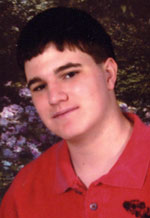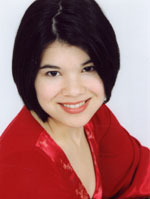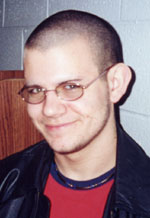Honorable Mention" essayists each received a $100.00 scholarship.
Twisted Dogma
By Andrew Schroeder
 |
Religion has inspired nations and given hope to the masses. It has also bred fear, hate, and persecution.
I have seen the danger of religious fundamentalism firsthand. During my middle-school years, I attended a school affiliated with the zealous Southern Baptist Convention. Most of the school's students had had a conservative Christian upbringing, a background reinforced by the school's almost maniacal bible teachers.
. . . The school's principal taught us the basics of the Southern Baptist Convention's twisted dogma: that all nonChristians burn in an eternal hell, that God literally talks to all of his worshippers, that nothing in the bible is questionable.
. . . The worst part of this divine comedy was that most of the students truly believed what they had been told. It is easier for one to believe something completely irrational than to ponder questions that can never be answered, easier to fit in than to show dissent.
Yet if the fundamentalist leaders of that school were to have their way, everyone would be forcibly indoctrinated in their closed-minded dogma. Without freedom of religion, there would not be freedom of speech; heretical remarks would almost certainly be persecuted. There would be no freedom of the press; fundamentalists wish to ban books that they don't agree with. There would be no freedom of assembly; public meetings of atheists, agnostics, or alternative religions, even other Christian sects, would be suppressed. The fundamentalists would force their poisonous rhetoric on everyone.
The founders of this nation were wise in their adoption of a godless constitution, a constitution offering all Americans the freedom to choose or reject religion as they please. In doing so, they intended to prevent persecution by religious fanatics.
Andrew, a graduate of H.V. Jenkins High School in Savannah, will attend Georgia College and State University. He is undecided on his major, but is leaning toward anthropology.
Freedom From Fear
By Miyoko Conley
 |
I am an American. However, because I am a Japanese-American, there is always a suspicion that I am not American--that I am a perpetual foreigner and can never be an American. This suspicion is also compounded by the fact that I am Buddhist, which is a nontheistic practice. Buddhism does not address the concept of a god or gods, because I have the freedom to choose my beliefs. I know that I have these freedoms because of the Constitution.
Many people equate being American with being Christian. At my high school we said the Pledge of Allegiance every day. I do not say the Pledge for one simple reason: I do not believe it should be a part of school or even of being an American. I believe this because of the words, "One nation, under God." Not everyone in this nation is "under God," because not everyone believes in God or any gods at all. Students and teachers at my school have gotten angry with others who do not say the pledge. One teacher wrote a letter to the students saying that he felt it was unpatriotic not to stand or say the pledge.
. . . I know that our U.S. founders did the right thing when they adopted a secular constitution. The U.S. Constitution allows people to choose their beliefs and allows them to practice what they wish as long as it does not harm other life. Everyone is equal in the eyes of the Constitution, and I strongly believe that is the way it should be. I feel that the separation of church and state is very important. Currently, some people are trying to amend the Constitution to forbid gay marriage, which to me defeats the purpose of our founders. In America, people are supposed to have the right to choose. Groups cannot be trod on for the personal benefit of others. Our founders might not have agreed with everyone's choices, but the point is that they wanted to give everyone an equal opportunity to be happy and free. I am able to pursue happiness even though I am not Christian. Due to my experiences, I know that the U.S. founders had the right idea from the beginning.
Miyoko graduated from Lakota West High School, located in West Chester, Ohio. She will be attending New York University, at the Tisch School of the Arts, where she will major in acting. Besides theater, her interests include singing, dancing, writing, visual art, and reading.
The Ideas of the U.S. Constitution
By Jonathan Smith
 |
. . .What is stated in that increasingly less-sacred document known as the United States Constitution is that "Congress shall make no law respecting an establishment of religion or prohibiting the free exercise thereof." What does that mean? It means, simply, that the government will not trample anyone's right to freedom of religion by endorsing any one religion over another. This protects Protestants from being oppressed by Catholics, and it protects Jews from being oppressed by Protestants. What it also does, much to the chagrin of the religious right, is protect Hindus and Muslims from oppression at the hands of Christians, and atheists from oppression at the hands of theists.
Our founding fathers knew that in order to achieve true liberty, citizens could not be forced, cajoled, or enticed to practice any faith, or be judged by the government for their decision not to practice it. The First Amendment is, essentially, a mandate for the separation of church and state.
. . . Any government endorsement of religion is a slap in the face to everyone except the individuals whose religious interpretation is represented in the endorsement.
Our founding fathers, slave owners most of them, were certainly not infallible. However, the document they produced in 1787 is the closest thing to perfection I can imagine, and the ideas presented by it, including the separation of church and state, are brilliant examples of how a democracy should be run. I hope that the persistent attempts of the religious right to undermine our Constitution go unrewarded, and I intend to do everything in my limited power to help assure that they do.
Jonathan Smith graduated from South Oldham High School in Oldham County, Ky. He plans to attend the University of Louisville, majoring in psychology. He writes, "When weighing my career options, I was torn between becoming a teacher, a lawyer, and a psychologist. While I believe both teachers and lawyers have chosen admirable career paths for themselves (honest lawyers, that is), I believe that I can have the greatest impact as a psychologist, helping young people cope with the problems society lays at their feet."
Recognizing the Threat of a Theistic State
By Dewi Harjanto
 |
. . . A theistic government, by its very nature, imposes a moralism that is both offensive and unjust. America is a nation that prides itself on the diversity in beliefs and culture of its citizens. Would this diversity be possible in a religious state? Frankly, the answer is no. There would be very few Jews, Muslims, Buddhists, Hindus, and agnostics who would feel welcome in an official Christian state. A government that endorses a specific religion places the values of some of its citizens above others in a pompous statement of which belief system is "right." Such posturing cannot be tolerated in a modern free society. . . .
The ramifications of the freedom to choose one's religion extend beyond merely the realm of the spiritual; religious freedom creates a culture that values liberty on the most basic level, a necessity for a truly free society. A democracy that does not even give its citizens the fundamental right to choose their own religion, or no religion, cannot be considered a democracy at all. Religion can be such an overwhelming force that even a government established as a well-intended Christian democracy will eventually disintegrate into some form of Christian totalitarianism. The goals of the church will at least occasionally supersede the goals of a responsible government, creating an unhealthy legislative balance skewed toward a belief system that not all citizens share. Furthermore, a government tied to a set of binding religious beliefs is under the constant threat of stagnation, because its citizens are taught to follow mindlessly rather than to think for themselves. In contrast, a government that encourages free choice and free thought is always open to innovation and adaptation. The freedom to choose, to believe in different things, is vital for the success of a democratic government because it is this freedom of thought that drives progress and change.
Religion is a deeply personal choice that should be strictly separated from public policy. As profoundly different entities that have distinct roles, goals, and responsibilities, church and state do not belong together. Any attempt to introduce religion into our government would be contrary to all of America's founding principles and would result in repression of free thought and the oppression of religious minorities. A godless Constitution, as a safeguard against religious encroachment in government, ensures that liberty remains a defining feature of America.
Dewi will be attending the Franklin W. Olin College of Engineering in the fall, pursuing a general engineering degree with an emphasis on the biomedical field with special interest in psychology, philosophy, and history.
She graduated from Northwood High School in California. She writes, "Some of my hobbies include reading and writing, watching quirky films, and eating vanilla ice cream."